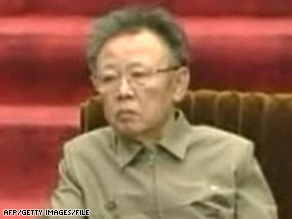
The U.N. Security Council called an emergency meeting Monday after world leaders reacted with outrage to North Korea’s latest nuclear test.
North Korea earlier said it had tested the weapon in an underground explosion, provoking an angry response from the world’s governments. It had threatened to conduct the test if the U.N. Security Council did not apologize for imposing sanctions on North Korea after it tested a rocket April 5. The secretive communist state also apparently test-fired a short-range missile Monday, the White House said. The Security Council called on its members to discuss the reported test Monday at 4 p.m. ET. The United States and many other countries denounced the test. Even China, North Korea’s strongest ally, opposed it. Watch how the test may have taken world by surprise » U.S. President Barack Obama castigated the North Korean government. Obama said North Korea’s actions “pose a grave threat to the peace and stability of the world.” Obama promised that the United States and the international community would strongly respond to the test. He added that North Korea’s actions had “flown in the face of United Nations resolutions” and were “inviting” deeper international isolation for the communist state. Adm. Mike Mullen, chairman of the Joint Chiefs of Staff, said it showed Pyongyang was becoming “increasingly belligerent.”
Don’t Miss
In the Field: Test fails to rattle South Koreans
Timeline: N. Korea nuclear dispute
In depth: North Korea nuclear tension
North Korea announced its underground nuclear test a little more than an hour after the U.S. Geological Survey reported a magnitude 4.7 seismic disturbance at the site of North Korea’s first nuclear test. There was no immediate information on the yield of the weapon used in Monday’s test. The Russian Defense Ministry said the explosion was between 10 to 20 kilotons. The U.S. State Department said it was analyzing the data. Mullen said it would take a couple of days to verify the reported test, but he added, “there’s no indication that it wasn’t as they say.” The North’s state-run Korean Central News Agency would say only that the latest test was safely conducted “on a new higher level in terms of its explosive power and technology of its control.” Watch more analysis on test » U.S. intelligence estimated the first North Korean test, in October 2006, produced an explosion equal to less than 1,000 tons of TNT. The low yield was a fraction of the size of the bombs the United States dropped on Japan at the end of World War II. Intelligence analysts had predicted North Korea would conduct a second rocket or nuclear test. The North threatened to do so after the Security Council voted unanimously to condemn its April launch as a violation of a 2006 resolution that bans North Korea’s ballistic missile activity. Watch how Pyongyang has used nuclear tests to gain concessions » North Korea insisted the rocket was a communications satellite. It retaliated by threatening to walk away from the six-party talks aimed at disarming the country of nuclear weapons. The talks — involving China, Japan, North Korea, Russia, South Korea and the United States — are intended to persuade North Korea to scrap its nuclear program. The North also expelled international inspectors from its nuclear sites, announced plans to restart the reactor that produces plutonium for its nuclear weapons, and threatened to launch more rockets and another nuclear device. Monday’s test was conducted “as part of the measures to bolster up its nuclear deterrent for self-defense in every way,” the North Korean news agency said. “They think this will enhance and embolden their diplomatic capability to deal with the other countries,” said Han Sung Joo, former South Korean ambassador to the United States. “Of course, it may be working the other way. But from their point of view, this is their lifeline, which they want to maintain.” China’s government “expresses firm opposition” to the test, in which North Korea “disregarded the opposition of the international community,” according to a statement from China’s Ministry of Foreign Affairs. North Korea’s latest move could clear the way for the United States and the other members of the six-party talks, minus North Korea, to impose new punitive measures against a country desperate for food and energy assistance. For now, however, the North’s nuclear arms program is not a major security threat, analysts say. The country has yet to build an effective bomb or develop an effective delivery system to a target country. Watch South Korea’s reaction to the nuclear test » Last year, North Korea acknowledged producing roughly 88 pounds (40 kilograms) of enriched plutonium — enough for about seven nuclear bombs. But analysts say North Korea is years from having a weapon it can put atop a long-range missile like those in the U.S., Chinese or Russian arsenals.
“I know a lot of people may think, ‘Oh no, a nuclear test. Does that mean war, conflict in the Korean Peninsula'” said Jim Walsh, an international security analyst at the Massachusetts Institute of Technology. “The answer is ‘no.'”